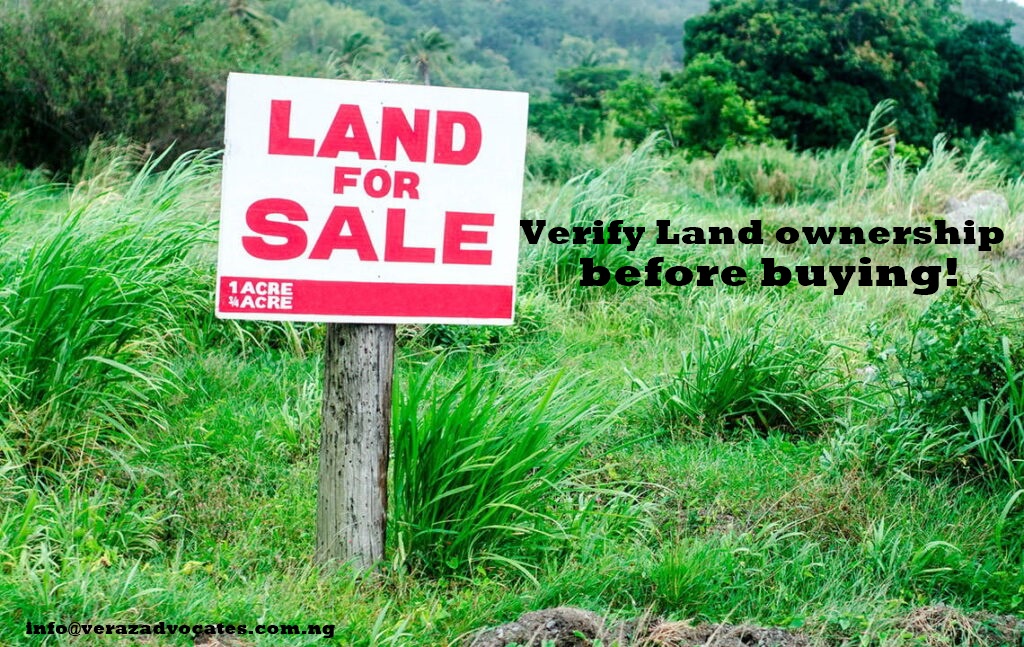
Buying land in Nigeria can be one of the smartest investments you can ever make but it can also be one of the riskiest if you don’t take time to verify ownership.
Many investors have lost millions to land scams because they failed to do due diligence. Fraudsters often sell land they don’t own, sell the same land to multiple buyers, or use fake documents.
We are here to give you step-by-step guide on how to verify land ownership in Nigeria and avoid costly mistakes.
Read:Understanding Real Estate in Nigeria
Why Land Verification is Crucial
In Nigeria, land disputes are common because of some the reasons stated below.
- Family lands are sold without consent of all members.
- Omonile or land grabbers (land touts) or community leaders resell the same plots.
- Fraudsters forge title documents like Deed of conveyance, Certificates of Occupancy (C of O) and survey plans.
- Buyers rely only on verbal assurances instead of documents.
Note that if you skip verification, you could lose your money and land, you could spend years in court and more still be unable to resell or develop the land.
Understanding Land Ownership in Nigeria
Land ownership in Nigeria is governed primarily by the Land Use Act, 1978. All land in each state belongs to the Governor, who grants rights of occupancy. Individuals and entities can hold land under a Customary Right of Occupancy usually rural or a Statutory Right of Occupancy (urban).
Land ownership is documented through titles like: Certificate of Occupancy (C of O), Deed of Assignment, Deed of Conveyance, Governor’s Consent, Survey Plan etc.
Steps to Verify Land Ownership in Nigeria
- Ask for the Land Documents
Request copies of the following;
- Survey Plan – Shows the land’s location and boundaries.
- Title Documents – C of O, Deed of Assignment, Deed of Conveyance, etc.
- Purchase Receipts – Proof of payment by the current owner.
- Tax Receipts or Utility Bills – May show long-term possession.
Red flag: If the seller hesitates or delays sharing documents, please walk away.
- Conduct a Search at the Land Registry
Each state has a Land Registry under the Ministry of Lands where you can confirm if the land has a valid title, if there is any government acquisition or restriction, if the seller’s name matches the record.
How to conduct a search:
- Get a search form from the Land Registry.
- Pay the required fee.
- Submit the survey plan or plot number.
- Receive a search report confirming ownership status.
Read: Things to know before buying Land in Rivers State Nigeria
- Verify the Survey Plan
Take the survey plan to the Office of the Surveyor-General in your state.
They will confirm if the survey is genuine and the exact location and whether it falls under government acquisition or excision.
- Check for Encumbrances
An encumbrance means there is a claim or legal issue on the land, like loans or mortgages tied to the land or ongoing court cases or government plans for the land.
- Confirm Seller’s Identity
- If it is family or community land, ensure all principal members sign off.
- For corporate sellers, ask for CAC incorporation documents.
- Cross-check IDs (International Passport, National ID, etc.) with the documents to ensure the name on the ID tallies with the sellers name.
- Visit the Land Physically
Go to the site yourself. Speak with neighbors or locals about the land’s history. Confirm that there are no squatters, boundary disputes, or pending issues. Take your own surveyor and lawyer along.
- Engage a Real Estate Lawyer
A lawyer ensures that due diligence is properly done. He or she ensures the authenticity of all documents. He prepares a legally binding purchase agreement. He also ensures that you get Governor’s Consent after purchase.
Some Common Land Scam Red Flags
- Seller pressures you to pay quickly.
- The price is too good to be true.
- Seller refuses to let you conduct a search.
- “This land belongs to our ancestors” without documents.
- No clear family head or signatures for family land.
If any of these happens while you are about to buy a land, please do not pay for such land because you will lose such land eventually.
In conclusion buying land in Nigeria doesn’t have to be risky. With proper verification, you can confidently invest without fear of fraud or future disputes. Always verify documents through official channels, visit the land physically and most importantly Involve a trusted real estate lawyer and a surveyor. Due diligence may cost you time and money now, but it will save you from losing millions later.
For further enquiry
Email: info@verazadvocates.com.ng
Call/WhatsApp: +234 8116486356
